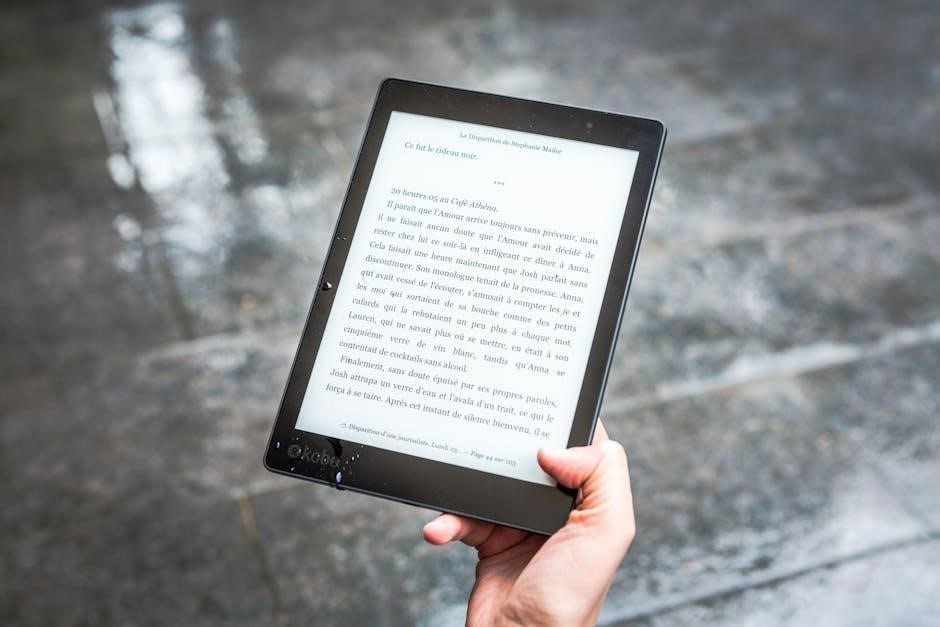origins of the modern world pdf
The modern world’s origins trace back to significant cultural‚ technological‚ and philosophical shifts. The early modern period laid the groundwork for globalization‚ interconnectedness‚ and the rise of new ideas. This era marked the transition from traditional societies to a more complex‚ interconnected global system‚ shaping the foundation of contemporary life and thought.

1.1. Defining the Modern World
Defining the modern world involves understanding its transformative characteristics‚ which distinguish it from earlier periods. The modern world is marked by globalization‚ technological advancements‚ and the rise of interconnected societies. It is characterized by the transition from traditional‚ agrarian communities to industrialized‚ urbanized ones. This shift has been accompanied by significant cultural‚ philosophical‚ and economic changes.
The concept of modernity emphasizes rationality‚ progress‚ and individualism. It is rooted in the belief that human societies can improve through science‚ education‚ and innovation. The modern world is also defined by its diversity‚ with global interactions shaping cultures‚ economies‚ and political systems. Professor Sharma‚ a renowned historian‚ highlights the interconnectedness of global history‚ which underscores the modern world’s complexity.
Key features of the modern world include the rise of democracy‚ the spread of digital communication‚ and the growing awareness of global challenges like climate change. These elements reflect the dynamic nature of modernity‚ which continues to evolve. The modern world is not static; it is shaped by ongoing processes of change and adaptation‚ driven by human ingenuity and the pursuit of progress.
In essence‚ the modern world is a product of historical transformations that have reshaped human societies. Its definition encompasses a broad range of social‚ economic‚ and cultural dimensions‚ making it a multifaceted and ever-changing entity.
1.2. Historical Context of Modernity
The historical context of modernity is deeply rooted in the transition from medieval to early modern societies. This period saw the decline of feudal systems and the emergence of centralized nation-states‚ which laid the groundwork for modern political structures. The rise of global trade networks‚ particularly during the Age of Exploration‚ connected distant regions‚ fostering cultural exchange and economic interdependence.
The medieval period‚ marked by religious dominance and limited scientific understanding‚ gradually gave way to intellectual and cultural movements like the Renaissance. This revival of classical knowledge sparked a renewed interest in human potential and rational inquiry‚ setting the stage for the Scientific Revolution. The printing press‚ invented by Johannes Gutenberg‚ played a pivotal role in disseminating knowledge widely‚ breaking the monopoly of religious and scholarly elites.
Professor Sharma‚ a historian specializing in global history‚ emphasizes the interconnectedness of these developments. The early modern period also witnessed the rise of Enlightenment ideals‚ which championed reason‚ individual rights‚ and progress. These ideas‚ combined with technological advancements‚ reshaped societal values and institutions‚ laying the foundation for the modern world.

The Renaissance and the Emergence of Modern Thought
The Renaissance marked a cultural and intellectual revolution‚ reviving classical knowledge and sparking humanism. It emphasized human potential‚ individualism‚ and reason‚ laying the groundwork for modern thought. This period saw advancements in art‚ science‚ and philosophy‚ reshaping societal values and fostering a new perspective on the world.
2.1. The Revival of Classical Knowledge
The Renaissance witnessed a profound revival of classical knowledge‚ reshaping the intellectual landscape of Europe. Scholars sought out ancient Greek and Roman texts‚ often preserved by monasteries or found in distant lands‚ to uncover the wisdom of the past. This revival sparked a renewed interest in philosophy‚ literature‚ and science‚ as thinkers like Petrarch and Boccaccio championed the study of classical works. The invention of the printing press further accelerated the dissemination of these texts‚ making them accessible to a broader audience. This resurgence of classical knowledge not only influenced education but also inspired artists and writers‚ who drew inspiration from ancient themes and techniques. The revival of classical knowledge laid the groundwork for humanism‚ emphasizing human potential and reason. It also challenged medieval perspectives‚ fostering a new curiosity about the world and its workings. This intellectual awakening played a pivotal role in the transition from the Middle Ages to the early modern period‚ setting the stage for future scientific and philosophical advancements. The focus on classical texts became a cornerstone of Renaissance thought‚ bridging the gap between antiquity and modernity.
2.2. The Role of Humanism in Shaping Modern Values
Humanism emerged as a central idea of the Renaissance‚ profoundly shaping modern values by emphasizing human potential‚ individualism‚ and intellectual curiosity. It championed education‚ critical thinking‚ and the pursuit of knowledge‚ often challenging traditional religious and societal norms. Humanists like Petrarch and Erasmus advocated for a well-rounded education‚ believing in the capacity of individuals to achieve greatness through reason and learning. This ideology fostered a cultural shift‚ valuing human achievements and the arts‚ while promoting a secular perspective alongside religious beliefs. The humanist focus on individualism encouraged people to question authority and seek personal growth‚ laying the groundwork for modern concepts of self-expression and autonomy. By celebrating human creativity and intellectual exploration‚ humanism became a cornerstone of modern values‚ influencing art‚ literature‚ and philosophy. Its emphasis on moral and ethical development also shaped ideas of citizenship and social responsibility. In essence‚ humanism bridged the gap between the medieval worldview and the emerging modern era‚ instilling a belief in human agency and progress that continues to resonate today.
2.3. The Scientific Revolution and Its Impact
The Scientific Revolution marked a profound transformation in human understanding‚ reshaping the way people perceived the natural world. This period‚ spanning the 16th to 17th centuries‚ saw groundbreaking discoveries by figures like Copernicus‚ Galileo‚ and Newton. Their work challenged the geocentric model‚ introducing the heliocentric universe and laying the foundation for modern astronomy.
The development of the scientific method was a cornerstone of this revolution. It emphasized experimentation‚ observation‚ and empirical evidence‚ shifting away from reliance on ancient texts and religious dogma. This shift fostered a culture of critical thinking and intellectual curiosity‚ paving the way for future scientific advancements.
The impact of the Scientific Revolution extended beyond science‚ influencing philosophy and politics. It encouraged skepticism towards traditional authority and promoted the idea that knowledge could be acquired through reason and observation. This era of rational inquiry not only advanced scientific understanding but also contributed to the broader intellectual movements of the Enlightenment.

The Enlightenment and the Rise of Rational Thought
The Enlightenment emphasized reason‚ individual rights‚ and intellectual freedom‚ reshaping modern thought. Key philosophers like Voltaire and Rousseau championed democracy and secularism‚ influencing political systems. Science and rational inquiry flourished‚ laying the groundwork for modern democracy and the separation of church and state‚ while fostering a culture of critical thinking and progress.
3.1. Key Philosophers and Their Contributions
The Enlightenment period was defined by the emergence of influential philosophers whose ideas reshaped modern thought. René Descartes‚ often regarded as the father of modern philosophy‚ introduced the concept of rationalism with his famous statement‚ “I think‚ therefore I am.” This laid the foundation for the scientific method and the pursuit of knowledge through reason.
John Locke‚ another pivotal figure‚ championed the idea of natural rights‚ arguing that individuals are born with inherent rights to life‚ liberty‚ and property. His theories profoundly influenced modern political systems‚ particularly the development of democratic governance and the separation of powers.
Voltaire‚ a vocal advocate for freedom of speech and religious tolerance‚ emphasized the importance of reason over superstition. His writings critiquing authoritarianism and advocating for human rights remain foundational to modern values. Similarly‚ Jean-Jacques Rousseau’s concept of the social contract challenged traditional authority‚ proposing that governments derive their power from the consent of the governed.
Immanuel Kant‚ a key figure in Enlightenment philosophy‚ contributed the concept of moral universalism‚ arguing that ethical principles should be based on reason rather than religion or tradition. His ideas on individual autonomy and moral responsibility continue to shape contemporary ethics and political philosophy.
Together‚ these philosophers laid the groundwork for modern democracy‚ secularism‚ and the primacy of reason‚ creating a legacy that endures in contemporary society.
3.2. The Influence of Enlightenment Ideas on Modern Democracy
The Enlightenment’s emphasis on reason‚ individual rights‚ and democratic principles has profoundly shaped modern democratic systems. Ideas such as the separation of powers‚ popular sovereignty‚ and the protection of individual liberties emerged during this period and became foundational to contemporary governance. Philosophers like John Locke and Jean-Jacques Rousseau argued that governments derive their authority from the consent of the governed‚ a concept that underpins modern democratic theory.

The Enlightenment also championed ideals of equality and justice‚ which influenced the development of constitutional democracies. The notion of natural rights‚ as articulated by Locke‚ inspired movements for human rights and the abolition of slavery. Additionally‚ the idea of progress‚ central to Enlightenment thought‚ encouraged societies to strive for improvement and reform.
These ideas were institutionalized in landmark documents such as the American Declaration of Independence and the French Declaration of the Rights of Man and of the Citizen. They continue to influence modern democratic practices‚ including the rule of law‚ free elections‚ and the protection of civil liberties. The Enlightenment’s legacy is evident in the global spread of democratic values and the ongoing struggle for justice and equality in the modern world.
3.3. The Role of Science in the Enlightenment
The role of science during the Enlightenment was pivotal in reshaping the way people understood the world. This era‚ often referred to as the Age of Reason‚ witnessed a significant shift towards empirical evidence and rational inquiry. The scientific method‚ which emphasizes observation‚ experimentation‚ and reproducibility‚ became the cornerstone of intellectual discourse‚ influencing various fields beyond natural philosophy.
Figures like Sir Isaac Newton played a crucial role in this transformation. His groundbreaking work on the laws of motion and universal gravitation not only revolutionized physics but also symbolized the power of human reason in uncovering natural truths. The Enlightenment’s embrace of scientific principles encouraged thinkers to apply similar methods of inquiry to social and political issues‚ fostering a culture of critical thinking and innovation.
The impact of scientific advancements extended beyond academia. Technological innovations‚ such as the development of the steam engine‚ laid the groundwork for the Industrial Revolution‚ transforming industries and daily life. In medicine‚ progress in understanding human anatomy and disease led to improved healthcare practices‚ enhancing the quality of life for many.

Moreover‚ the Enlightenment saw the rise of scientific institutions and societies‚ such as the Royal Society in England‚ which provided platforms for collaboration and the dissemination of knowledge. The widespread publication of scientific texts‚ facilitated by advancements in printing‚ made these ideas accessible to a broader audience‚ contributing to a more informed and engaged public.
Despite facing resistance from traditional authorities‚ particularly religious institutions wary of scientific inquiry‚ the scientific community persisted. Advocates for science‚ recognizing its potential to drive progress‚ championed its role in society. The enduring legacy of this period is evident in the continued pursuit of scientific knowledge and its influence on modern technological and societal advancements.
In essence‚ science during the Enlightenment was not merely a tool for understanding the natural world but also a catalyst for broader cultural and political change‚ laying the foundation for the rational and progressive ideals that define modern society.

The Industrial Revolution and Economic Transformation
The Industrial Revolution marked a transformative shift from agrarian economies to industrialized societies. Technological innovations‚ such as the steam engine and mechanized manufacturing‚ revolutionized production processes. This era spurred urbanization‚ expanded global trade‚ and reshaped economic systems‚ laying the foundation for modern capitalism and the interconnected global economy we see today.
4.1. Technological Innovations and Their Impact
The Industrial Revolution was driven by groundbreaking technological innovations that transformed production and society. The steam engine‚ invented by James Watt‚ revolutionized industries by replacing human and animal power with mechanized energy. This innovation enabled mass production‚ increased efficiency‚ and reduced costs‚ laying the foundation for modern industrialization. The power loom and spinning jenny‚ key inventions in textiles‚ accelerated manufacturing processes‚ making cloth production faster and more affordable. These advancements not only boosted economic growth but also reshaped labor dynamics‚ leading to the rise of factories and urbanization.
Transportation underwent a seismic shift with the development of railways and the steam locomotive. Railways connected distant regions‚ facilitating the movement of goods and people on an unprecedented scale. This network enabled global trade to expand‚ fostering economic interdependence among nations. Telecommunications‚ such as the telegraph‚ further enhanced connectivity‚ allowing for rapid communication over long distances. Together‚ these innovations created a ripple effect‚ influencing every aspect of life‚ from work routines to social structures.
The impact of these technologies extended beyond economics‚ sparking cultural and environmental changes. Urban centers grew rapidly as people moved to cities for factory jobs‚ leading to the development of new social systems. However‚ the reliance on fossil fuels and industrial processes also introduced environmental challenges‚ setting the stage for modern concerns about sustainability. In essence‚ the technological innovations of the Industrial Revolution were the catalyst for the modern world‚ shaping its economic‚ social‚ and environmental landscapes.
